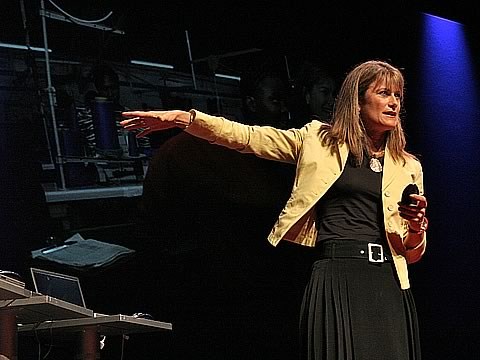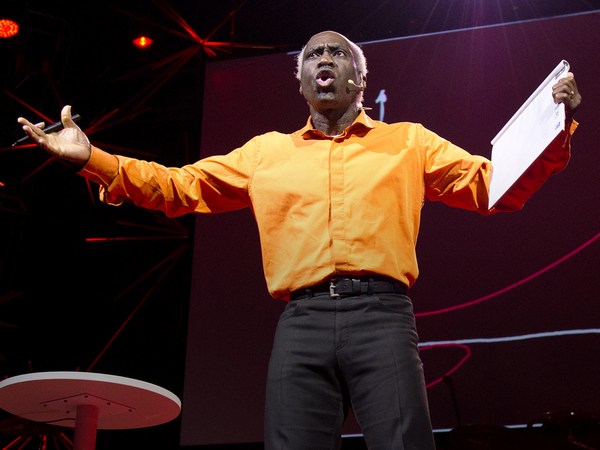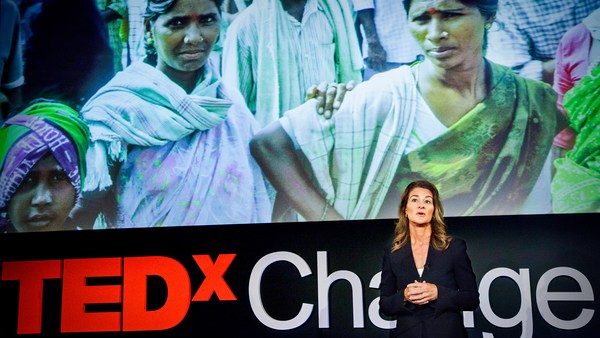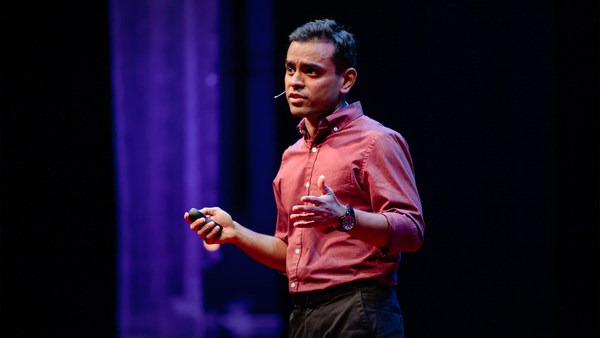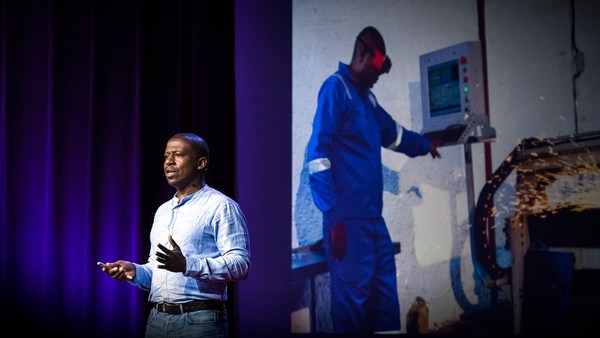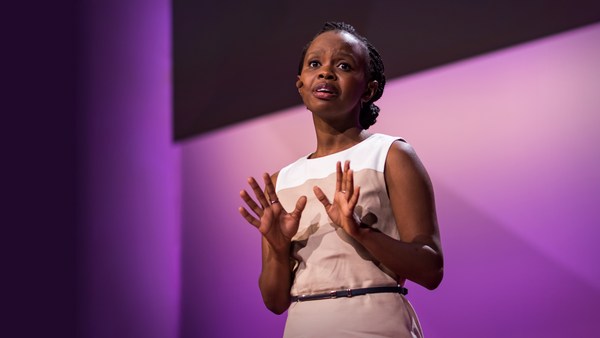Meet Inook. He's a pretty happy guy. And I'd be pretty happy, too, if this was the first time my community had just gained access to fresh water. Inook is from the country of Malawi, the small sliver of a country in Southern Africa, known as "The Warm Heart of Africa." Over the past 10 years, five million more people like Inook in Malawi have gained access to fresh water. But what's unfortunate is that this picture is a lie. I'll come back to that in a second.
Ten years ago, two Waterloo engineers sparked a movement across Canada, "Engineers Without Borders." This movement was based on the concept that it was completely unacceptable that 5 million people in Malawi did not have access to fresh water, when us engineers back in Canada were working on problems such as making a photocopier increase its speed from 149 pages a minute to 151 pages per minute. We needed to work on problems that mattered. I was fortunate, I founded the Calgary chapter here. I got to be the first director of overseas programs for Engineers Without Borders in Africa, where I worked for four years. And I got to work with hundreds of businesses, non-government organizations, governments, all working in this field of development. It was really fantastic working for Engineers Without Borders because even though we worked on hundred-million-dollar projects, we had this philosophy that if we were really going to understand the problems in local Africa, we needed to live like local Africans. So, as a lot of ex-patriots would spend most of the time in the capital cities and boardrooms, we'd spend our time in villages learning local languages, traveling on public transports.
And what this allowed us to do was to get a really deep understanding of what was going on at the field level. Combined with this experience and hundreds of other Engineers Without Borders experiences, we got a really interesting perspective of what's going on in this aid industry. The aid industry has gotten a lot of attention lately. A lot of economists have become authors and have written about it. There's a lot of controversy about its effectiveness, some even asking the question, "Has aid failed?" It's a very interesting question. Now, I can confidently say on behalf of Engineers Without Borders staff members that, failed or not, we definitely feel that the aid system is broken. And when I say broken, I'm not talking about what the media usually talks about. It's not about corrupt dictators or about corruption. Those issues still happen in Africa, but they're much more the minority than they are the mainstream today. I'm talking about aid being broken in democratically elected, stable governments with no civil unrest, countries like Ghana, Malawi and Zambia.
So, I talked about Malawi. The World Bank has stated that 80% of the people in Malawi have access to fresh water sources. So one of our staff members in Malawi, this is Owen, was visiting one of those water points. It was a gravity-fed system that was commissioned by the Canadian government and finished about a year and a half ago. A gravity-fed system basically is a bunch of pipes that pipe water down from an elevated region down into a number of communities where there are taps, and people can access that water. And he was going around turning on some of those taps, and some weren't working. So he asked the community, "How many of these aren't working?" And they said, "Well, out of 113, 81." 81? What's the problem? What's going on?
He found out that a lot of the pipes had sprung leaks and broken down. All right, not a big deal, pipes break down everywhere. But the problem with this project was that, even though the infrastructure was built, there was no thinking about who was going to maintain the system. Some people really took initiative and tried to fix the pipes themselves, but there was a lack of affordable spare parts available. This situation is typical. This is a graphic showing one area of Malawi, I think it's an urban area, where the green dots are functional water points, yellow, are ones that are working but breaking down, and red are not functional. Hardly eighty percent. Actually, Engineers Without Borders has done some work and found out that even though there's 80% coverage of water points, 40% are not working. See, this issue is ... A lot of donors and projects end up focusing on the hardware side of the issue and not really realizing the importance of the software side of things. At first it's like, software -- of course you have to do maintenance. But when you think about it as people donating to charities, it makes you feel a lot better if you know that your money went to something tangible, something like a well, something like a school, something like giving a family a goat. It's not as sexy and easy to tell your friends about how you helped fund a water committee or paid for teacher salaries. So when I say that this picture of Inook is a lie, it's not a lie when the picture is taken. It only becomes a lie a year or two afterwards.
When looking at these pictures, one of my great colleagues said, "Everything people see from Africa doesn't matter. And everything that matters from Africa, people don't get to see." And this problem goes a lot further that just broken down water points. Owen, after seeing this water point, discovered not more than 30 feet away: "Hey there's another set of taps that look really broken down, too, but they're not attached to the system." And he asked the community, "What's that?" They said: "Oh, that's the American government gravity-fed water system." It was built over ten years ago. He said, "What happened to that?" They said, "Oh, it also broke down about a year and a half later." How is it that a project that failed ten years ago was rebuilt with almost the same technology, same process, and had exactly the same failure ten years later?
I've recently joined a start-up company that sells goods online, a lot of them from Africa, fair-trade goods -- it's sort of like the ethical eBay or Amazon. And what we've learned being a private sector start-up is, if we don't serve our customers and we don't provide them the product they need, they won't buy it. And then if we don't innovate, change and adapt to their needs, we go out of business. They have a power to hold us accountable. If we look to the public sector, it doesn't adapt and change quite as fast as the private sector, but at the end of the day, if the elected government doesn't meet the needs of its constituents, they have a chance to vote them out of power, therefore holding them accountable.
But in the development sector, if they don't serve the needs of their beneficiaries -- and they're not just NGOs, but governments and businesses as well -- the beneficiaries have no power to vote them out or to fire them. The people who have that power are the donors. And when you look at the system, you can see some of the challenges. Development is the sector that focuses more on pleasing the donors and making them happy and communicating to them, as opposed to understanding the needs of the beneficiaries. Because of that, systematic challenge is very slow to innovate, there's very little change, and you get exactly the same project built ten years later that fails in exactly the same way.
So what we do about this? First answer is easy: we invest in the private and public sectors in the developing world. They're inherently structurally built to be more sustainable and to allow beneficiaries to hold them accountable. However, 70% of people in sub-Saharan Africa still make less than two dollars a day and are still in poverty. And a lot of that reason is because the private and the public sector are not serving them appropriately. So we do need to invest in businesses and governments in Africa, but it's still going to take a long time for the problems to be fixed. Therefore, that leaves us with one option and we need to work with this system. Therefore, we have to fix it.
We need to make it more accountable, more creative and more transparent. We need to start innovating, coming up with really neat ideas -- ideas like giving beneficiaries a chance to rate their projects using their mobile phones -- that donors and NGOs can understand. Or moving our donors closer to our beneficiaries. Currently, only 20% of the Canadian International Development Agency's African staff are based in Africa. Ideas like funding development sectors like VCs fund businesses: What would it be like if a donor funded ten projects and expected four of them to do OK, one of them to do fantastic and five of them to fail? And not all of the solutions need to be that complex. Engineers Without Borders is working on one that's actually quite simple; it's admitting failure.
My first project with Engineers Without Borders was in India. I worked with a bunch of schools, the poorest schools in India, the untouchable caste. This is Bani, she was a girl who was in one of those schools and she and her classmates had to spend two to three hours a day walking to collect water to bring it back to the school so they could have fresh water to drink and for cooking and for going to the bathroom. My job in Engineers Without Borders was to help solve the problem. I worked with the communities; we came up with rainwater harvesting solutions to collect water from the rooftops during the monsoons, bring it through gutters, filter and store it for the dry season. I worked there for a number of months, and by the time I left, we had the project funded and being implemented. I returned back home to Canada almost a hero. My friends and family were like, "Wow, that's fantastic! You gave up your job in the oil and gas sector to go volunteer in India. That's really inspiring."
A year later, I contacted my NGO to see how everything was going with the rainwater harvesting systems. And they told me that not a single one was still operating. The reason was because a lot of them had been built, but some of them had broken down because there was no maintenance schedule put in place. I had made the exact same mistake that I criticized earlier. When I thought of my friends and family back home who thought I was such a hero, I felt like an impostor. I thought of Bani, I didn't help her at all.
Admitting failure is actually quite hard, and I didn't tell many people about this. And one of the only things that helped me feel better about this -- and it's a bit of a shame to say this — was that I started to learn that other people in Engineers Without Borders had failed, too. But Engineers Without Borders has this culture of embracing failure openly and letting us talk about it. And it was only through a bunch of us talking about failure that we really got to see we're making a lot of mistakes, and we're making the same mistakes and can learn from them. And we started to innovate and change.
Engineers Without Borders is drastically different now, 10 years later than what we thought Engineers should be doing in development. We don't build water points anymore; in fact, we don't build anything other than spreadsheets. We now have this innovative marketing campaign, "Sponsor an African spreadsheet," because we understand that the problems are not hardware problems; it's all about that software side of things. But it's a hard concept to get across to people; they want to fund wells and schools. But it's really about the software side of things, and it's a lot longer a process to fund those things. And it's not sexy, but it works. Our staff members were really exited to share this failure internally, but we still were not doing a good job of letting other people know. And some very courageous field staff were getting upset at the management because other projects were going to make the same failures; they weren't learning. So they pushed our management staff. And we were nervous publishing our failures, but for the last three years, Engineers Without Borders has published an annual failure report citing our biggest failures.
At first, I was asked, "What do your donors think?" and I think, "How would my donors feel if they knew the money they had spent and saved up and generously donated had had no impact?" And you know, that's tough. And our donors felt that, too. But once they started reading the failures, they understood the power of those lessons learned and realized it's an injustice not to be sharing these. Then we realized that not everyone reads reports, so we built a website, admittingfailure.com. This is for all organizations to come and start admitting their failures, and to start having a discussion about failure. The concept is catching on.
The Harvard Business Review, just last month, published their first review focused on failure. Two big companies lately have also dealt with failure. I talk to my friends in other sectors and they're like, "It's not just the development sector that has this challenge, it crosses into a lot of other sectors." Two companies had big failures lately. What's interesting about them is, one of them publicly admitted the failure and talked about what they learned from it and what they'll do next time. The other one kind of tried to not talk about it at all. It will be interesting looking forward to see which of those strategies works. I'd like to ask people to, first of all, think about: How does your organization think about and share failure? Maybe ask the person next to you, because I think it can generate some really interesting conversations.
And lastly, I'd like to turn back to this question, "Has aid failed?" I think I'll say that, for me, the answer is "Yes," but only because it hasn't failed enough.
Thank you.
(Applause)
